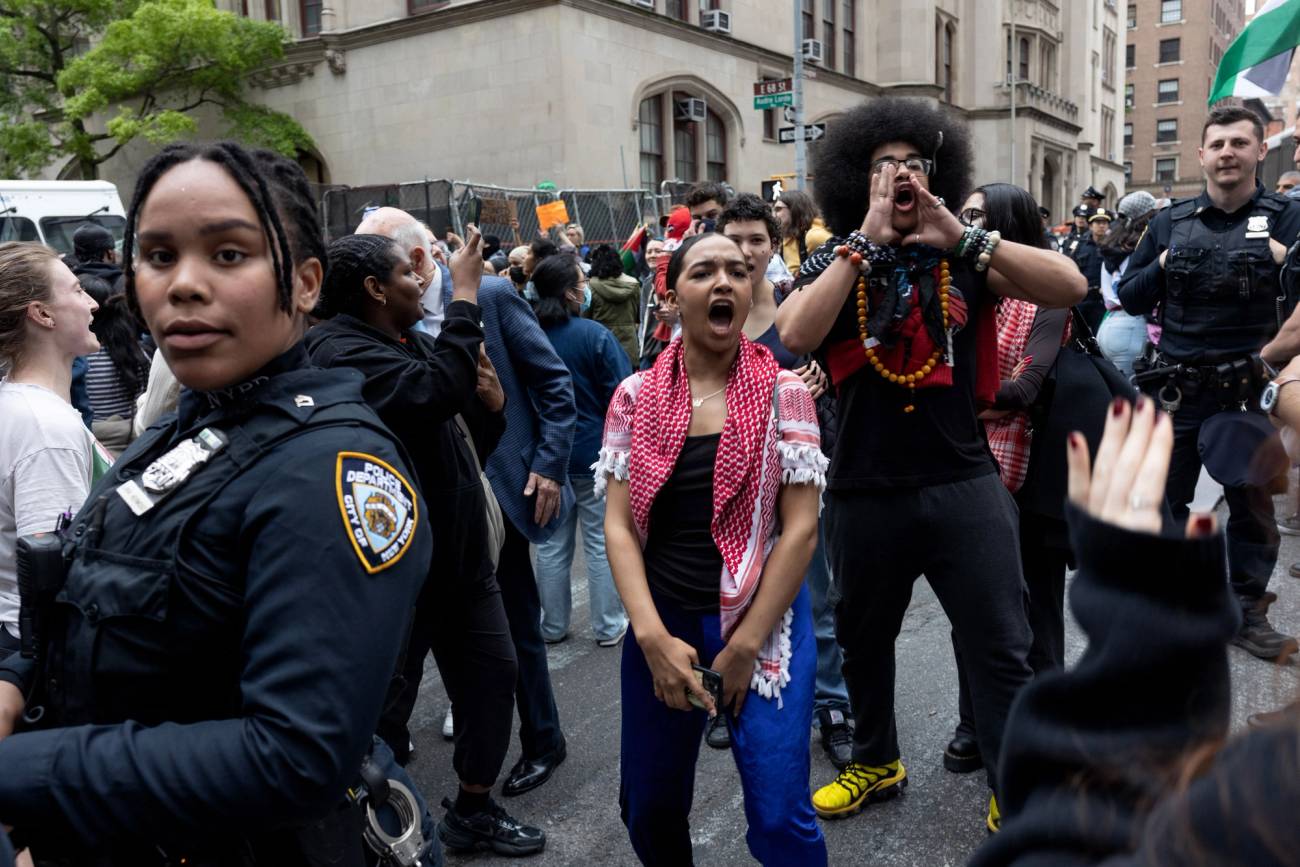 Ludzie gromadzą się przed szpitalem, ponieważ ponad 1000 osób, w tym bojownicy Hezbollahu i lekarze, zostało rannych, gdy pagery, których używają do komunikacji, eksplodowały w Libanie. (Fot. REUTERS/Mohamed Azakir)
Ludzie gromadzą się przed szpitalem, ponieważ ponad 1000 osób, w tym bojownicy Hezbollahu i lekarze, zostało rannych, gdy pagery, których używają do komunikacji, eksplodowały w Libanie. (Fot. REUTERS/Mohamed Azakir)
 Izraelczycy umieścili materiał wybuchowy w pagerach Hezbollahu. “Zemsta będzie potężna”
Izraelczycy umieścili materiał wybuchowy w pagerach Hezbollahu. “Zemsta będzie potężna”
Marta Urzędowska
Izraelczycy majstrowali przy partii pagerów z Tajwanu
.
Choć Hezbollah od początku oskarżał o atak Izrael, z którym jest w stanie wojny, Izraelczycy dotąd nie potwierdzili, że za nim stoją. Jednak „New York Times” cytuje ważnych urzędników z Ameryki i regionu, którzy przyznają, że to Izraelczycy umieścili w pagerach niewielkie ilości materiałów wybuchowych – ok. 50 gramów na urządzenie.
Chodziło o partię 3 tys. pagerów modelu AR 924 zamawianych przez Hezbollah z tajwańskiej firmy Gold Apollo i importowanych do Libanu. Hezbollah rozdał je swoim ludziom w całym kraju, niektóre trafiły też do Iranu i Syrii, do ludzi, z którymi grupa utrzymuje bliskie kontakty.
Poza materiałem wybuchowym w każdym pagerze zainstalowano mechanizm, który pozwalał zdalnie go zdetonować. We wtorek w tym samym momencie wszystkie urządzenia dostały wiadomość wyglądającą na powiadomienie od dowództwa Hezbollahu. To właśnie ta wiadomość zdetonowała materiał wybuchowy i sprawiła, że w jednym momencie wybuchły tysiące urządzeń. Pagery, zanim eksplodowały, przez kilka sekund wydawały ponoć pulsujący dźwięk.
Według libańskich władz zginęło jedenaście osób, a ponad 2,7 tys. jest rannych. Wśród ofiar śmiertelnych jest ośmiolatka – prawdopodobnie córka członka Hezbollahu. Wśród rannych jest z kolei ambasador Iranu w Libanie Mudżtaba Amini, któremu pager wybuchł w dłoni, raniąc rękę i twarz. Iran to sojusznik i sponsor zarówno Hezbollahu, jak i Hamasu.
Kilkanaście osób zostało rannych też w Syrii.
Nasrallah kazał swoim ludziom przejść na pagery. Smartfony mieli “zniszczyć albo zakopać”
Libański premier Nadżib Mikati potępił „przestępczą agresję Izraela” i nazwał atak „poważnym naruszeniem libańskiej suwerenności”.
Atak w Libanie to kolejny etap trwającej od miesięcy intensywnej eskalacji na granicy Libanu z Izraelem – Hezbollah śle na izraelskie terytorium pociski i rakiety, Izrael odpowiada ostrzałem i nalotami. Po obu stronach granicy zginęło już kilkaset osób, a setki tysięcy musiało opuścić swoje domy.
Eskalacja to efekt wojny w Strefie Gazy, trwającej od października 2023 roku. Hezbollah twierdzi, że atakuje izraelskie terytorium w ramach solidarności z palestyńskimi terrorystami z Hamasu.Także w środę od rana trwa wymiana ognia na granicy, a w przygranicznych izraelskich miejscowościach zawyły syreny, przy czym – jak podają agencje – nie widać szczególnego nasilenia ostrzału.
Choć do tej pory wymiana ognia na granicy Izraela z Libanem była umiarkowana, bo żadnej ze stron nie opłaca się konflikt na wielką skalę (Izraelczycy mają na głowie wojnę w Gazie, a w Libanie trwa olbrzymi kryzys finansowy i polityczny chaos), w ostatnich dniach władze Izraela zapowiadały większą operację wymierzoną w Hezbollah.
Izraelczycy zaatakowali wyjątkowo zmyślnie. W związku z trwającą eskalacją na granicy szef Partii Boga Hassan Nasrallah w lutym b. roku mocno ograniczył możliwość używania przez swoich ludzi smartfonów. Publicznie stwierdził, że są niebezpieczne, bo Izraelczycy łatwo je namierzają, dlatego członkowie Hezbollahu mieli je “zniszczyć albo zakopać”. Znacznie trudniejsze do namierzenia pagery, których wcześniej używali sporadycznie, teraz miały stać się powszechne. Po ataku zapewne zrezygnują z ich używania i przejdą na komunikację całkowicie analogową, co znacznie utrudni im działanie.
Szef libańskiego MSZ: Zemsta Hezbollahu będzie potężna
Atak na pewno podkopie morale Hezbollahu i uświadomi jego ludziom, że Izrael jest w stanie dopaść ich wszędzie. W dodatku forma, w jakiej zaatakowali Izraelczycy ujawniła tożsamość wielu członków Partii Boga – na nagraniach jakich pełno w sieci, można zobaczyć w czyjej kieszeni wybucha urządzenie.
Wtorkowa operacja na pewno oznacza dalszą eskalację na linii Izrael-Hezbollah. Partia Boga już sypie pogróżkami, zapowiadając „surowe ukaranie Izraela za tę odrażającą agresję”.
Także szef libańskiej dyplomacji Abdullah Bu Habib przyznał w rozmowie z „New York Timesem”, że Libańczycy liczą się z odpowiedzią Hezbollahu. – Na pewno się zemszczą i to potężnie. Jak? Gdzie? Nie mam pojęcia – przekonywał
Izraelczycy zdecydowali się na atak mimo napomnień sojuszników, by nie eskalowali sytuacji na granicy z Libanem. Jeszcze w poniedziałek przedstawiciel administracji USA Amos Hochstein spotkał się w Tel Awiwie z ministrem obrony Izraela Joawem Gallantem, prosząc, by Izraelczycy nie pakowali się w kolejną wojnę.
Izraelczyka nie przekonał. – Okno na osiągnięcie rozwiązania na drodze dyplomatycznej zamyka się, bo Hezbollah zdecydował się związać na stałe z Hamasem – skwitował Gallant po spotkaniu. – Dziś jedynym sposobem, by mieszkańcy północnego Izraela mogli wrócić do domów, są działania militarne – dodał.
Minister mówił o setkach tysięcy Izraelczyków, którzy z powodu eskalacji na granicy z Libanem musieli opuścić swoje domy i przenieść się do innych regionów Izraela. O ile mieszkańcy pogranicza ze Strefą Gazy, którzy uciekli tuż po październikowym ataku Hamasu, dawno wrócili do domów, Izraelczycy z granicy z Libanem na razie nie mają na to szans.
Amerykanie przyznają, że atak na pagery ich zaskoczył. – Nie braliśmy w tym udziału, nie zostaliśmy uprzedzeni, zbieramy informacje – przekonywał rzecznik Departamentu Stanu Matthew Miller. – Jednak nasz przekaz zarówno do Izraela jak i innych stron konfliktu pozostaje ten sam: Liczymy na rozwiązanie dyplomatyczne – dodał.Jednocześnie podkreślił, że Ameryka „wzywa Iran, by nie wykorzystywał tego incydentu do siania niestabilności i zwiększania i tak już dużych napięć w regionie”.
Waszyngton boi się eskalacji nie bez powodu. Wojna Izraela z Hezbollahem oznaczałaby katastrofę dla Libanu, gwałtowny wzrost napięć na linii Izrael-Iran i chaos w całym regionie. Libańska Partia Boga jest bez porównania potężniejsza niż Hamas, a wojna Hezbollahu z Izraelem sprawiłaby, że obecny konflikt w Strefie Gazy wyglądałby zaledwie na małą rozgrzewkę.
Red. Ludmiła Anannikova
Zawartość publikowanych artykułów i materiałów nie reprezentuje poglądów ani opinii Reunion’68,
ani też webmastera Blogu Reunion’68, chyba ze jest to wyraźnie zaznaczone.
Twoje uwagi, linki, własne artykuły lub wiadomości prześlij na adres:
webmaster@reunion68.com




